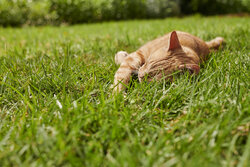Fleas in cats
There is always a risk that cats will catch fleas, especially when the weather is warm. An owner wishing to spare their pet from these bloodsuckers, should take precautionary measures.
Almost every cat will catch fleas sooner or later, whether through contact with other cats or out wandering in the garden or park. Generally it is only cats that live exclusively indoors which are spared - as well as cats whose owners have protected them in good time. To this end, a range of very well tolerated and effective preparations are meanwhile available from vets. Products which prevent development, for example, stop a cat from becoming infested by fleas in the first place - providing they are applied in good time and on a regular basis. Generally the flea treatment is mixed into food at the start of the season and takes effect by preventing any fleas from multiplying.
If a cat already has fleas
In many cases it is clear that a cat already has fleas as flea excrement can be seen in the fur: place the cat on a piece of white paper or in the bathtub and comb it with a flea comb. Dampen the dark grains that fall to the ground with water. If these are flea excrement, red streaks will appear as flea excrement contains blood.
In such a case, a so-called adulticide should be used. This is a type of treatment which quickly kills off the fleas on a sustained basis. It needs to be applied once a month, generally in the form of a solution which is trickled onto the skin of the cat. If an infestation of fleas is suspected, this treatment should be started without delay.
Treating an infestation of fleas
The longer the cat has already been infested by fleas, the greater the chance that there are also eggs and larvae in the fur. Moreover, less than 10% of fleas live on the animal - the rest are found in the environment especially in areas where the animal often sleeps or lies. These areas should always be treated at the same time by cleaning and vacuuming thoroughly. For long-term prevention, a development preventer can be used during and after treatment with an adulticide. It is best to consult your vet about which options make most sense in your specific case.
You may also like this

When a cat keeps scratching itself
Possible causes if your cat keeps scratching itself

Allergies in cats
Typical signs of allergies in cats

Signs of illness in cats
A regular check-up helps to detect any illnesses

Moulting in cats
How to help your cat during moulting
